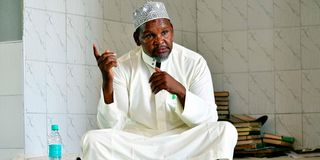Imam walking the talk in fight against FGM

Tana River County Council of Imams and Preachers of Kenya Chairman Sheikh Abdullah Haji Gudo gestures during the interview at Masjid Rahma Mosque on Thursday last week.
Sheikh Abdullahi Haji Gudo is the Council of Imams and Preachers of Kenya (CIPK) chairperson in Tana River County.
When Sheikh Haji, 47, took up the challenge of speaking out against female genital mutilation (FGM), he knew that it would be an uphill task. The Imam at Masjid Rhama Mosque in Garsen grew up in a community where FGM was widely embraced.
Until 2011 when the government outlawed the harmful practice, at least five communities in Tana River practised FGM.
According to an analysis conducted by the United Nations Children’s Fund (Unicef) last year, an estimated four million girls and women in Kenya have already undergone FGM.
Says Sheikh Haji: “When I became a religious leader in my 20s and got an opportunity to travel to other parts of the country, it hit me — if FGM was a religious act, how come there were Muslims who didn’t practise it?”
It was a difficult beginning. To gather people and talk about a subject that they believed to be hinged on the very religious texts that he was teaching as an Imam.
The decision to oppose the deeply ingrained tradition was furthered by the effects of FGM on the health and well-being of the women in his community. When Sheikh Haji saw what FGM had done to his sisters and other young girls, he decided to stop it.
His initial engagements with circumcisers and women were hostile. They’d walk out of his meetings while accusing him of receiving funding to distract them from their faith and told him off for talking about a woman’s nakedness in public.
With support from Unicef, Sheikh Haji travelled for an exchange programme in Sudan in 2010, an experience he describes as eye-opening.
“There were many books and reading materials on FGM and religion. Reading them made me more empowered to speak against FGM,” he says.
Upon his return, he made copies of the books and shared them with other religious leaders with whom they joined hands to fight against FGM.
This year’s International Day of Zero Tolerance for Female Genital Mutilation calls for partnership with men and boys to transform social and gender norms to end FGM.
In some parts of Tana River County like Hola, community activists are using football tournaments to advocate against the practice. Mr Rhoba Kariuki, a 23-year-old player with Iqra FC, says the team and other clubs use football to break the silence on FGM, early marriages, education and girls' rights.
“Almost every player has a personal experience of the challenges that their sisters have gone through. That is why we decided to join in the fight against FGM,” says the fourth-year computer science student. Sheikh Haji says one of the greatest impacts over the past two decades is the great reduction in the number of people who perform the act.
Ms Zeinab Ahmed, a child protection specialist with Unicef Kenya, says public conversations about cutting in parts of the country where FGM is a predominant practice has increased over the years. For his work in challenging the norms and driving conversations to kick out FGM, Sheikh Haji was honoured as a national hero during last year’s Mashujaa Day celebrations.





